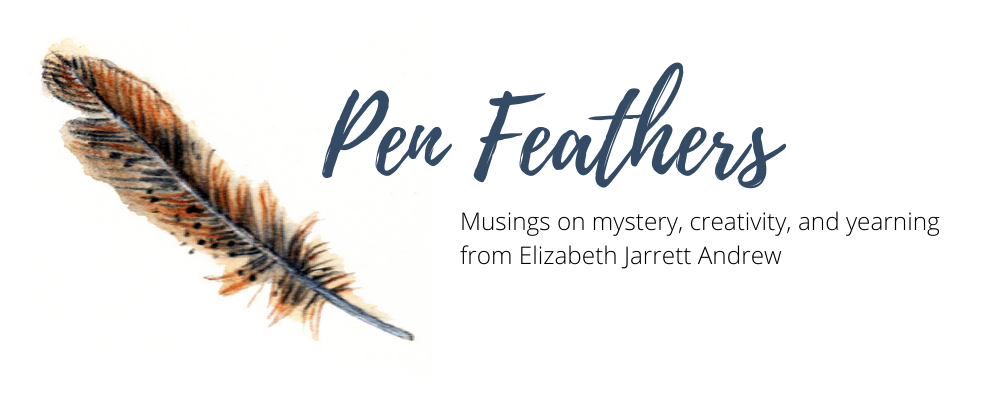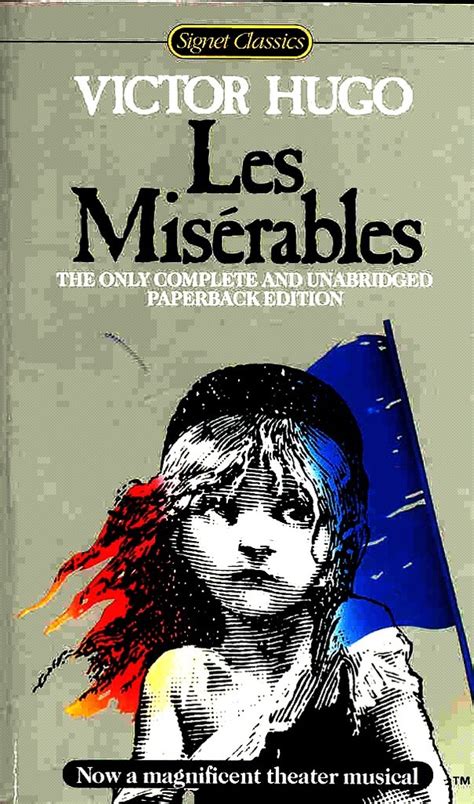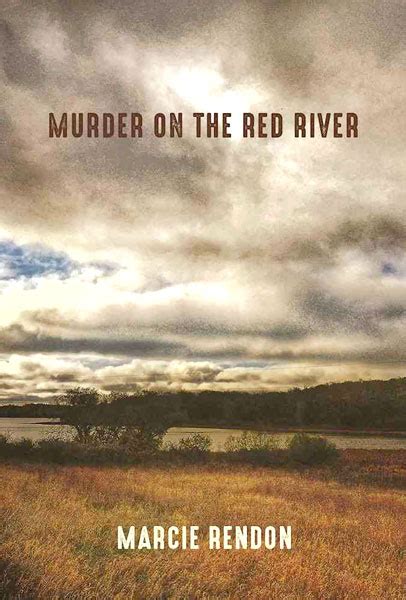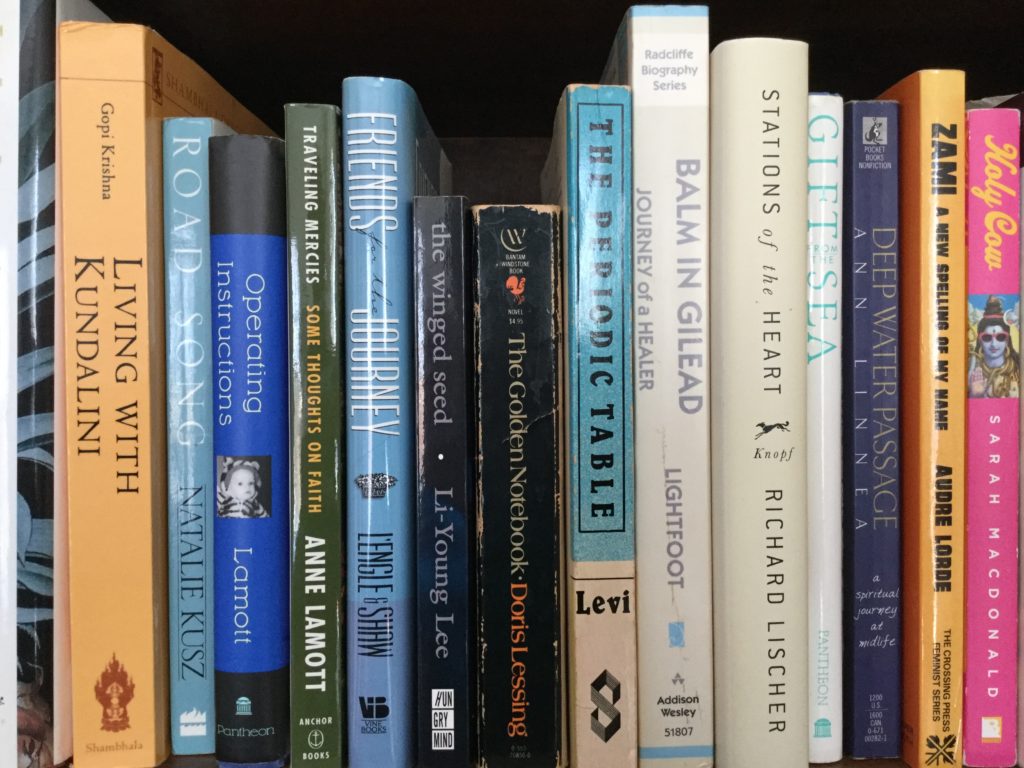
Taking Refuge in Books
Before 2021 sweeps me away, I’d like to pay tribute to the authors who grounded, inspired, and sustained me through 2020. Given the relentless barrage of awful news and the seemingly daily need to adjust to new circumstances, I took refuge in the classics. I’ve always felt that reading is a chance to participate in a conversation that transcends time and place; in 2020, I drew strength from the broad continuity of this dialogue. You’ll find only a few new books on this list. I offer you these highlights from my reading and welcome your recommendations. Whenever a book brings us more alive, we can become its ambassadors by way of thanks! –Elizabeth Jarrett Andrew |

BEST ESSAYS:
For years I’ve leaned on a few essays of James Baldwin as deeply wise and trustworthy–the man did his personal work. So when George Floyd was murdered and I found myself searching for ways to better understand my own intractable white privilege, I dug out my browned, crumbling paperback copy of NOBODY KNOWS MY NAME. While many of the essays here are more journalistic and wrangle with being a Black American abroad, a few (“Alas, Poor Richard” and “The Black Boy Looks at the White Boy”) are timeless, and some of his zingers sting just as much today. Take these:
“It is a terrible thing to say, but I am afraid that for a very long time the troubles of white people failed to impress me as being real trouble. They put me in mind of children crying because the breast has been taken away.”
“The really ghastly thing about trying to convey to a white man the reality of the Negro experience has nothing whatever to do with the fact of color, but has to do with this man’s relationship to his own life. He will face in your life only what he is willing to face in his.”
“The world had prepared no place for you, and if the world had its way, no place would ever exist. … This is not the way this truth presents itself to white men, who believe the world is theirs and who, albeit unconsciously, expect the world to help them in the achievement of their identity. But the world does not do this–for anyone; the world is not interested in anyone’s identity. And, therefore, the anguish which can overtake a white man comes in the middle of his life, when he must make the almost inconceivable effort to divest himself of everything he has ever expected or believed, when he must take himself apart and put himself together again, walking out of the world, into limbo, or into what certainly looks like limbo.”
Is there a better description anywhere of what white people are going through today? Let’s hope we “do our personal work” as well as Baldwin did.

BEST BOOK ON WRITING:
To tell you the truth, the vast majority of writing texts I pick up I just skim. Because I write them myself, I feel some obligation to follow what other writers say about process and craft, but I’ve read so many, and not found my writing much improved nor have I learned anything significantly new for it, that I dread reading most titles that cross my desk. At the same time, I’m constantly hoping for a text that can shed light on how and why writing is a transformational act, and what I might do to facilitate this transformation, both in me and in my readers.
John Daido Loori’s THE ZEN OF CREATIVITY satisfies. Here is a deeply wise perspective on art-making. Here is a relationship to writing I might yet grow into. Here is a text I actually bought to add to my shelf.
“In Zen, we say that each one of us is already a buddha, a thoroughly enlightened being. It’s the same with art. Each one of us is already an artist, whether we realize it or not. In fact, it doesn’t matter whether we realize it—this truth of perfection is still there. Engaging the creative process is a way of getting in touch with this truth, and to let it function in all areas of our lives.”

BEST MEMOIR:
Westover understands how memoir works: Take a personal, unresolved quest that in some ways is unresolvable, and pursue it through hundreds of well-curated moments, each of which moves that quest a step or two forward. She also hasn’t been tainted by the current fad in memoir that ditches the narrator’s interior exploration for the sake of past action. EDUCATED is a thoughtful book that knows precisely why it’s important, not just to Westover but to all of us. It’s a demonstrated testimony to the salvific work of education.

BEST FICTION:
I last read MIDDLEMARCH in college and hated every page, probably because I had to plow through 700 of them in less than a month. But recently I inherited a beautiful silk-bound Folio Society copy from Emily’s Aunt Dorothea, complete with lecture notes; this time through I took my sweet time, and I savored every moment. The Dorothea of Middlemarch reminds me of myself, overly passionate about faith and willing to overlook others’ faults to a fault. George Eliot’s astute observations about the subtleties of motivation and limitations of character and relational dynamics are so incisive, so charming, I couldn’t get enough of it. I perked up every time the narrator interjected to comment on the story–such an out-of-date literary technique that I nonetheless adore! “It is wonderful how much uglier things will look when we only suspect that we are blamed for them. Even our own persons in the glass are apt to change their aspect for us after we have heard some frank remark on their less admirable points.” Or, even better: “He was at present too ill acquainted with disaster to enter into the pathos of a lot where everything is below the level of tragedy except the passionate egoism of the sufferer.” There’s more accurate psychological observations packed in this novel than most therapists are capable of. Much gratitude to Aunt Dottie!

I saw LES MISERABLE in the theater as a teen and have wanted to read it ever since. Biting social criticism, dark portraits of characters ravaged by poverty, and especially the exploration of what sustains one’s moral bearings through extreme economic hardship… Jean Valjean’s struggles with and profound leaning on faith tickled my theological fancy. Yup. I loved this book.

Murder mysteries aren’t my usual fare; I picked up MURDER ON THE RED RIVER because a neighborhood book group chose it and because Rendon’s a local Indigenous author. The plot has some of the usual weaknesses of first novels, especially strangely prioritized details, introduced and then ignored characters, and weak links between characters and the story’s action. Even so, I was compelled by Cash and the Red River Valley landscape, which is so intricately portrayed it upstages other characters. Unlike a lot of contemporary fiction (which I can’t get through), I found myself strangely drawn into Cash’s smart, hard-scrabble life and read straight through. Can’t wait to read book two, GIRL GONE MISSING.

BEST SPIRITUAL READING:
We all consciously or unconsciously live according to an internal map, formed by culture, religious upbringing, lived experience, and our deliberate spiritual seeking. Every once in a while, something causes us to see that map, and thus call it into question.
EYE OF THE HEART, Cynthia Bourgeault’s latest, exposed my own cosmology and offered another, one that allows for more love (and greater responsibility) than I’ve thought possible. Each time Cynthia posits a theory about how the world functions, I react with skepticism–“How could she (or any of the spiritual masters or great faith traditions she leans on) know THAT?” Then, sitting with this new worldview, I watch as irreconcilable experiences I’ve had (encountering the essence of loved ones after they’ve died, being profoundly shaped by scenes I’ve imagined, sensing energetic aliveness transforming me from the inside out, watching the silent communion of a prayer group ripple into a larger congregation) fall into place.
Sure, any map we make is a flawed construction. But some maps create space for more good, growth, healing, connection, and possibility than others. It doesn’t matter whether or not it’s accurate. What matters is whether working with this map brings energy and light, into my own life and through my life into the world. I’ll be studying EYE OF THE HEART and Cynthia’s source material for the rest of my days. (Here’s a caveat for those new to Cynthia; start with THE WISDOM WAY OF KNOWING and work your way up to this one. EYE OF THE HEART is definitely the deep end of the pool.)
